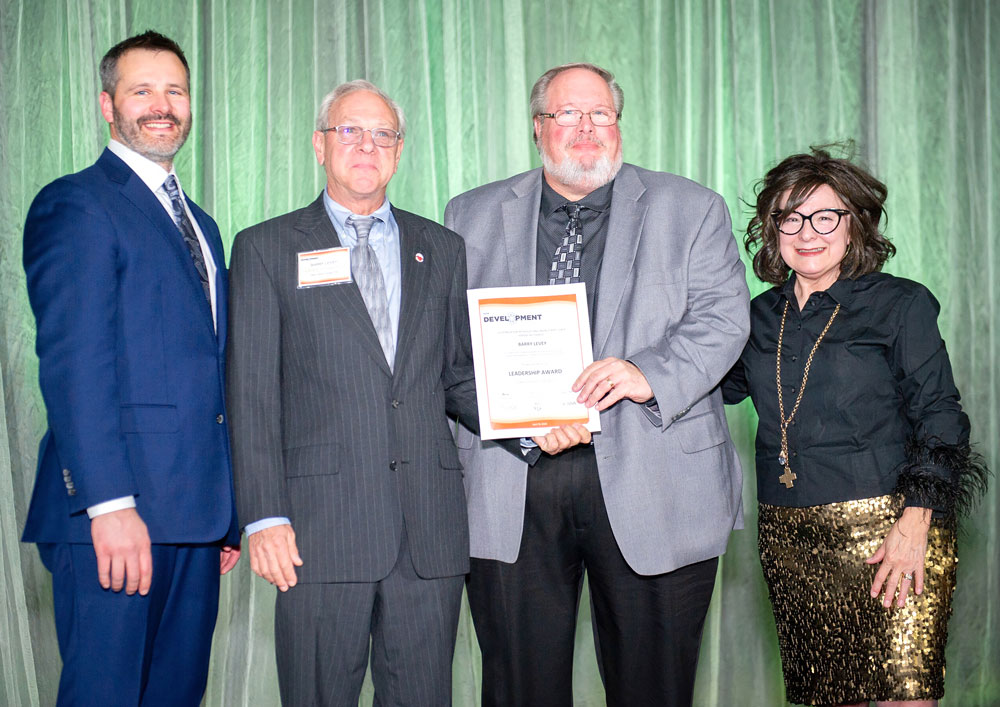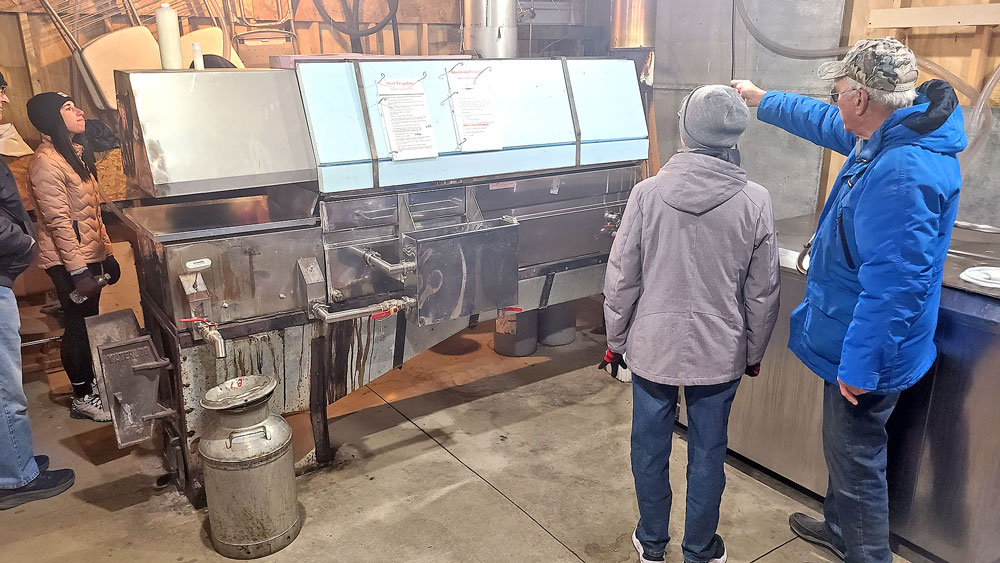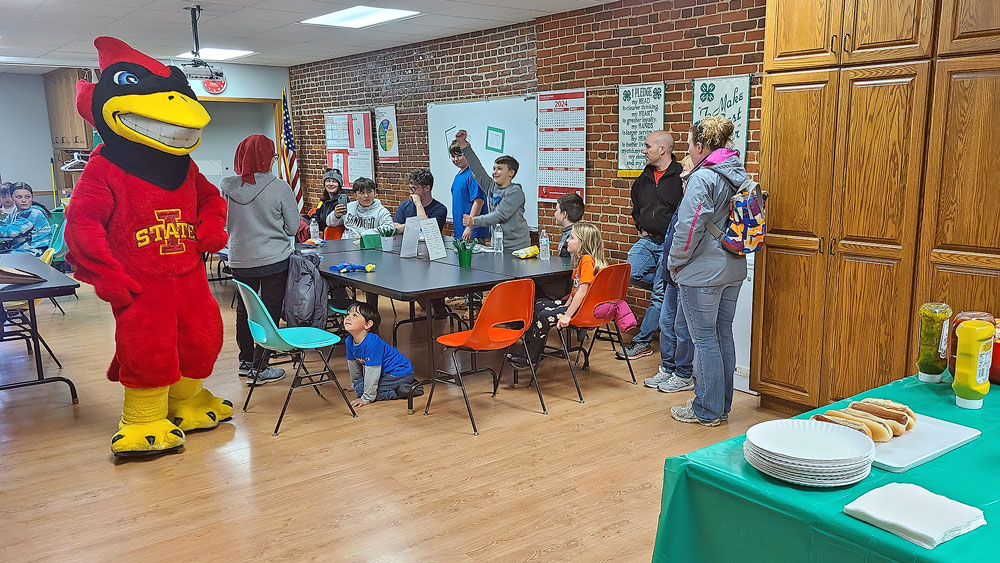Floyd County family named 2017 Iowa Master Farmers

By Kate Hayden, khayden@charlescitypress.com
Pam Johnson left her family farm right after graduating Osage High School, intending to follow a nursing path. It didn’t quite work out that way.
“I thought I wanted to do other things,” Johnson said.
Now, Johnson tells the story and challenges of Iowa agriculture. She and her husband, Maurice, are two of the awarded 2017 Iowa Master Farmers, named by the publication Wallaces Farmer every year since 1926. They received their award on March 16, along with only three other family farms across the state.
The Iowa Master Farmers award honors farmers who demonstrate outstanding management of farms, and leadership at local, state and national levels –– and Pam Johnson has found herself a leader at every level.
After years of local and state leadership through the Floyd County Development Authority and the Iowa Farm Bureau, Johnson became the first woman president –– “and hopefully not the last,” she said –– of the National Corn Growers Association in 2012-2013.
The Johnsons are sixth-generation Floyd County farmers who manage 1,200 acres, 90 acres of which are dedicated to conservation programs fostering wetlands, pollinator habitats and native trees and grasses. For 38 years the pair also farrowed and finished hogs. The buildings are now rented out to a young farmer, Johnson said. The couple’s sons also have 50 ewes that are currently lambing.
“We each have our own enterprises, but we share machinery and labor, and just all pitch in,” Johnson said.
After being nominated for the Master Farmers award, the couple submitted an application detailing some of these management practices, and the challenges they navigate when planning for the farm’s future.
“We talked about the traditional things, and how things have improved over the years,” Johnson said. “For us, our kids are there for the seventh generation, so transitioning to the next generation and how that affects your business plan. And then (we talked) about how you’ve given back, what have you done in your local community and what’s your service.”
REGIONAL MASTER FARMERS
Pam and Maurice Johnson are two of several Iowa Master Farmers from the Floyd County region over the years. Past winners include:
1955: Alvin Christiansen, Nora Springs
1957: Ray Mitchell, Charles City
1960: Donavon Kruse, Charles City
1975: Genevieve and Duane Boyd, Charles City
1976: Malcolm McGregor, Nashua
2008: Leland Boyd, Charles City
The Johnsons started in the 1970s, rented a house and 300 acres, and got 10 farrowing crates from Pam’s uncle. The business slowly grew as the couple purchased pieces of land, and survived tough times in the 1980s. Following that time, Johnson joined a small group of residents who founded the Floyd County Agriculture Development Authority.
“We were labeled a blighted county because White Farm (factory) had closed, and the unemployment rate was so high,” Johnson said. “(George Cummins) got a small group together and said, ‘do you like what’s going on in your county, and what do you think it’s going to look like in 10 years?'”
“We started looking at our own farms and our community with a new perspective, and what we could do to change things.”
Johnson stepped up her work telling agriculture’s story after attending a meeting with women in the Floyd County Farm Bureau. Johnson volunteered to attend a legislative event in Washington, D.C. –– her first trip to the nation’s capitol. There she started building relationships with legislators.
“Because of some of that early work in Floyd County, my name kind of got out there, so I kept getting asked to do more things,” Johnson said.
Ron Litterer –– another Floyd County resident who served as President of the National Corn Growers Association –– and his wife, Jan, recommended Johnson as a candidate to run for the Iowa Corn Promotion Board. She then served as chair of the board, began working on a research project with the national organization, and then ran for president.
Now Johnson is vice president of the MAIZALL Alliance, an international group of corn growers in the U.S., Brazil and Argentina. Through MAIZALL, Johnson has traveled to China, the World Food Security Summit and the United Nations Food and Agriculture meeting. The group recently hosted the latest mission in Brazil, inviting 30 Parliament members from Uganda to talk about innovation and technology in farming and sustainability practices.
“We were able to speak from all three countries and talk about how innovation and science and technology had not only helped us on our own farms, but had helped our farms, rural communities, our country,” Johnson said. “They went back to advocate for those changes in Uganda.”
That leadership work has changed her whole approach operating a family farm, Johnson said.
“To be able to have the opportunity to bring my voice to the table, but then listen for perspectives –– whether it was in a Floyd County group listening and working together, or then at a state level, a national level or now an international level … just thinking out of the box, and figuring out, how can we look at things differently to solve problems together,” Johnson said.
The future still hinges on problem-solving at the grassroots level, Johnson said. Dropping agricultural product prices are presenting new challenges, and farmers will have to focus on developing consumer relationships internationally and creating risk management tools for their businesses.
“We’re in challenging times now,” Johnson said. “We all knew that prices would correct, because we are in a business that thrives on supply and demand. Now we have to concentrate on building demand for ag products around the world, and remembering that only 5 percent of the world’s population lives within the United States.”
Johnson also encourages farmers to make connections with state and national leaders and legislators.
“Making sure your voice is known and having that connection to decision-makers is more important than ever right now,” she said. “When you join your voice with other people it’s even more powerful … Get out there and be part of it, just like that original group did in Floyd County.
“If you don’t like what you’re seeing or you think you can make positive change, the question to ask is, ‘what more can I do about it?'”









Social Share